| |
EMPEROR JESUS CONSTANTINE—THE FIRST "CHRISTIAN" EMPEROR—WAS MARRIED
TO HIS MOTHER HELENA AUGUSTA! |
|
Emperor Constantine the
Canaanite and his Druidess mother Helena founded the Latin Papacy and the
city of Constantinople. No wonder Pope Leo X conferred on King Henry VIII
the pompous title Fidei Defensor (Defender of the (Latin) Faith).
Saint Paul—a Roman citizen
by birth—predicted that mother and son incest would give birth to
the Wicked One or the Papacy!! (I Corinthians Ch. 5, II Thessalonians Ch.
2).
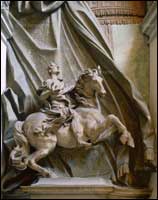
Equestrian statue of Emperor
Jesus Constantine in the Vatican. |
| |
Emperor
Jesus Constantine was the grandson of Roman Emperor Caracalla
by his mother Julia Domna.
Constantine's
mother, Helena Augusta, was a British Druidess.
The
marriage of Constantine
and Helena foundered the Latin Papacy and the city of Constantinople!!
Helena
also "discovered" the "true cross" in Jerusalem! |
|
|
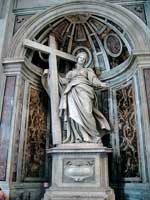
Statue of Helena Augusta
in the Vatican.
|
The founding of Constantinople
led directly to the ruin and abandonment of the imperial capital in Italy.
The British and Canaanite strategy of divide and conquer led to the decline
and fall of the Roman Empire . . . and not the Christians!!
In the New Covenant there
are only 3 references to Christians . . . but none at all to "Catholics."
The most common designation for Christians was Nazarenes, after Joshua
of Nazareth, the Jewish Messiah.
The Bible says that almost
all the human race perished in a universal Flood about 4500 years ago. The
only survivors were Noah, his unnamed wife, and 3 sons: Shem, Ham and Japheth
(JAHphet).
Sometime after the landing
of the Ark, Noah gave up his carpenter trade and became a farmer:
And Noah
began to be a farmer, and he planted a vineyard. Then he drank of the wine
and was drunk, and became uncovered in his tent. And Ham, the father of Canaan,
saw the nakedness of his father, and told his two brothers outside. But Shem
and Japheth took a garment, laid it on both their shoulders, and went backward
and covered the nakedness of their father. Their faces were turned away, and
they did not see their father’s nakedness (Genesis 9:20-23).
The Hebrew idiom "to
look upon nakedness" or "uncover nakedness" means to make love
to or have sex with a person. When Noah awoke from his wine he cursed his
YOUNGER son for his reprehensible behavior:
So Noah
awoke from his wine, and knew what his younger son had done to him. Then he said: “cursed be Canaan;
a servant of servants he shall be to his brethren” (Genesis
9:24-25).
Shem and Ham were actually twins. Ham was the EVIL twin, and he had sex with his father's wife.
Emperor
Septimius Severus arrived in Britannia in 208
At the beginning of the
3rd century, the remotest outpost of the Roman Empire in the West was called
Eburacum (place of yew trees). It was inhabited by a tribe called the Brigantes.
They later became the dominant tribe and gave their name to the island.
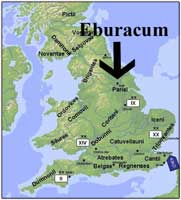
The Roman fortress Eburacum
is now called York. |
| |
Eburacum
was the remotest outpost of the Roman Empire in Britannia.
It
was inhabited by wild men called Brigantes, who were ruled by
women; tattooed their bodies, stripped for battle, and married their mothers!
In
early 208, Eburacum had very unexpected visitors: the mighty Roman
Caesar, his wife, and 2 sons!! |
|
|
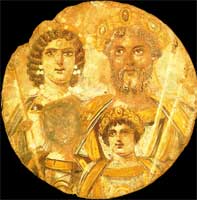
Caesar, Julia
Domna,
and son Caracalla. |
Caesar's family consisted
of his wife Julia Domna and their 2 sons, Bassianus Antoninus (Caracalla)
and Publius Septimius Geta.
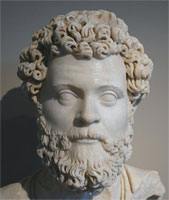
Septimius Severus (145–211).
Emperor from 193 to 211. |
| |
Severus
was known as the "African Emperor" as he was a Carthaginian
Canaanite.
The
Carthaginians were the deadly enemies and rivals of Roma for centuries.
Femme
fatale Julia Augusta was also a Canaanite and Jezebel on
steroids! |
|
|
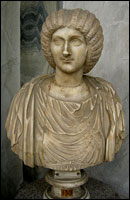
Empress Julia Domna
(174–217). |
Emperor Severus was 63
at the time and his wife was 34. The Emperor was suffering from gout and had
to be carried on a litter. Having the Emperor along would lend legitimacy
to any baby born to his wife during their 3-year stay in Britannia.
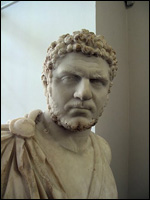
Emperor Caracalla
(188–217). |
| |
Bassianus
(Caracalla) was a year older than his brother Geta. When their
father was poisoned in early 211, both boys became Emperors
of Roma.
While
fighting "barbarians," the depraved Caracalla was having
sex with his own mother.
Incest was quite common in the mysterious island called Britannia. |
|
|
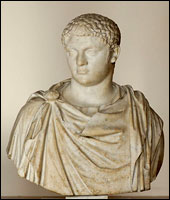
Emperor Geta
(189–211). |
Saint Paul predicted this very situation, 150 years before
it happened.
In the Congregation
at Corinth, there was a WICKED man sleeping with his mother, and Saint Paul
rebuked the Christians sharply for allowing such a WICKED practice to continue:
It is
actually reported that there is fornication among you, and such fornication
as is not so much as named among the nations, that
one should have sex with his father's wife (I Corinthians
5:1).
At that
time, Saint Paul, or anybody else, had scant knowledge of what went on in
that mysterious, secretive island called Britannia. Saint Paul told the Congregation
to excommunicate the WICKED person:
But those
who are outside Elohim judgeth. Therefore put away from among yourselves
that wicked person
(I Corinthians 5:13).
That WICKED
man was a forerunner or type of the Antichrist who was to be revealed before
the end of time:
And then shall that
Wicked be revealed, whom JEHOVAH shall consume with the spirit of his
mouth, and shall destroy with the brightness of his coming (II Thessalonians 2:8).
In early
211, the monster Caracalla killed his own father and then the 2 boys became Caesars.
In May 211, Domna and the 2 Emperors left Eburacum and returned to Roma . .
. without the son that was born to Domna in Britannia!!
Caracalla,
Geta, and Julia Augusta arrived back in Roma in 211
The remaining family arrived
back in Rome without the twins that Domna had concieved by her son Caracalla.
The monster Caracalla wasted no time in murdering his own brother while he
clung to his mother for protection....Then Caracalla married his
own mother:
It is of
interest to know the way in which they say he married his stepmother Julia.
She was a very beautiful woman, and once when she displayed a considerable
part of her person, as it were in carelessness, Antoninus said, "I should
like to, if I might," whereupon, they relate, she replied, "If you
wish, you may; are you not aware that you are the emperor and that you make
the laws and do not receive them?" By these words his violent passion
was strengthened for the perpetration of a crime, and he contracted a marriage,
which, were he in truth aware that he made the laws, it were his sole duty
to forbid. For he took to wife his mother (by
no other name should she be called), and to fratricide he added incest, for
he joined to himself in marriage the woman whose son he had recently slain. (Dio Cassius, Roman
History).
Emperor Nero was also
suspected of having sex with his mother Agrippina, but there is no record that
he actually married her.
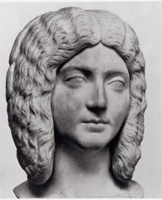
Bust of Julia Domna. |
| |
Caracalla
wasted no time in murdering his own brother Geta.
Then
he married his mother.
Together,
they established a dynasty that lasted until 235.
In
212, Caracalla gave Roman citizenship to all free men and women
in the Empire.
|
|
|
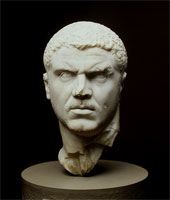
Bust of Caracalla. |
Before that time, Roman
citizenship was a highly coveted honor, mostly confined to Italians, and very
difficult to obtain for a non-Roman. Roman citizenship meant that you had
the right to appeal to Caesar personally if you were accused of a crime.
Saint Paul was a Roman
citizen by birth, and he used that citizenship to appeal to Caesar, and thus
escaped from the hands of murderous Jews in Jerusalem (Acts 22:28).
Caracalla is most famous
for the Baths of Caracalla. Plans for the baths were drawn up by Septimius
Severus and completed by his son. The baths took 6 years to complete and were
open to the public.
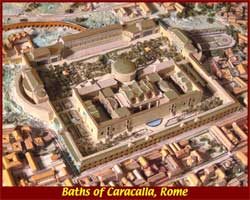
The Baths of Caracalla were built
on a monumental scale.
|
| |
Emperor
Caracalla is mostly known for the monumental Baths of Caracalla
which took 6 years to complete.
Today, the
baths are in ruins and a reminder of the past glory of Roma
BC (Before Constantine)!
|
|
|
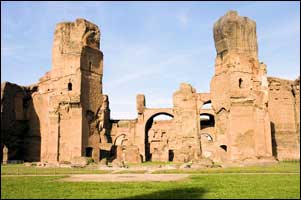 The ruins of the
Baths of Caracalla.
The ruins of the
Baths of Caracalla. |
While on a military expedition
against the Parthians, Caracalla was assassinated by one of his own soldiers.
He was succeeded by a man named Macrinus, but his reign only last for one
year.
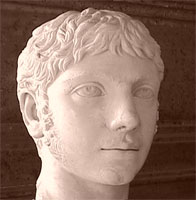
Bust of Elagabalus
(c. 203–222).
Emperor
from 218 to 222). |
| |
The
depraved Elagabalus was also a son of Julia Domna.
In depravity he equaled Nero, Caligula, and his own father.
Alexander
Severus was another son of Domna and the last of the Severn dynasty.
|
|
|
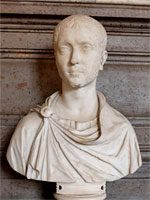
Bust of Severus Alexander
(c. 205–235).
Emperor from 222 to 235. |
By the end of the reign
of Alexander Severus the mighty Roman Empire was ruined. The following era
was called the Crisis of the Third Century—50 years of civil wars, foreign
invasion, and the collapse of the monetary system.
Caracalla
and Julia established the Constantinian dynasty in Britannia!!
A son was born to Domna
during her stay in Eburucum. The boy's father was his mother's son Caracalla.
The baby was adopted by a Roman tribune named Constantinus. From that time
onward, gold began to flow from Roma to Britannia, and that remote outpost in the wilderness became
a significant player in Roman politics.
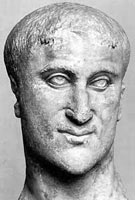
Constantinus Chlorus
(c. 245–306). |
| |
The
baby born to Domna in Eburucum became the founder of the Constantinian
dynasty.
Around
274, Tribune Esus Constantinus Chlorus married Druidess Helena.
They
had one son together, the future Emperor Jesus Constantine. |
|
|
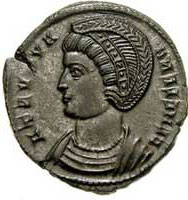
Helena Augusta
(250–330). |
The future Emperor Constantine
(the first "Christian" Emperor) was in reality the grandson of Caracalla
and Domna.
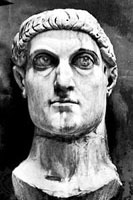
Emperor Constantine (274–337).
Emperor from 306 to 337. |
| |
Emperor
Jesus Constantine was the grandson of Caracalla and Julia Domna.
His
claim to the throne rested on his descent from Emperor Caracalla.
At
age 24, he left Britannia and joined the court of the infamous
persecutor Diocletian at Nicomedia. |
|
|
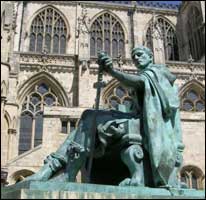
Statue of Constantine
in York, England. |
Growing up in Britannia,
Constantine would have seen crosses everywhere as it was a ubiquitous Druid
sun worship symbol:
The cross,
as a symbol, was known to and revered by the Druids, and their mode of consecrating
an oak tree was first to fasten a cross beam upon it if the two horizontal
arms were not sufficiently prominent. Upon this right branch they cut in the
bark, in fair characters, the word "Hesus",
upon the middle or upright stem the word "Taramis," and upon the
left branch the word "Belenus." (Wright, Druidism: the Ancient
Faith of Britain, p. 181).
In 312 AD, Constantine
led a huge army of 90,000 of his naked, tattooed countrymen across the Alps
and laid siege to Roma.
Emperor
Jesus Constantine founded the Papacy in 313
Emperor Constantine had
his spies in Roma and they persuaded Maxentius to leave the safety of the city confront Constantine outside the walls. It was a disastrous decision, as
the his army was defeated and the Emperor was drowned in the Tiber River.
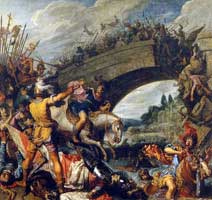
The Battle of Milvian Bridge. |
|
In
312 AD, Emperor Jesus Constantine led his huge army across the
Alps and laid siege to Roma.
After
conquering Roma, he founded the rival city of Constantinople.
This
split the Roman Empire in half. |
|
|
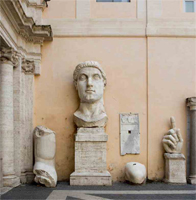
Colossal head of Constantine
in Rome. |
The year
313 AD can be considered the official beginning of the Papal occupation of
the city of Rome.
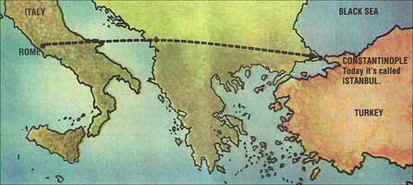
The removal of the capital began when Constantine
conquered the East. |
| |
Emperor
Constantine's removal of the capital from the imperial city
left the bishop of Roma free to vault into the seat of the Caesars.
Occupation
by the Papacy led to the ruin of Roma!
|
|
|
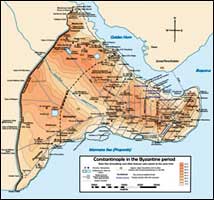
Constantinople
was surrounded
on 3 sides by water. |
Saint Paul
warned the Christians that Antichrist would be revealed before the end of
the world, but something mysterious was hindering or restraining his appearance:
Now
we beseech you, brethren, by the coming of Joshua the Christ, and by our gathering
together unto him, That
ye be not soon shaken in mind, or be troubled, neither by spirit, nor by word,
nor by letter as from us, as that the day of Christ is at hand. Let
no man deceive you by any means: for that day shall not come, except there
come a falling away first, and that man of sin be revealed, the son of perdition; who
opposeth and exalteth himself above all that is called Elohim,
or that is worshipped; so that he as Elohim sitteth in the temple of Elohim,
showing himself that he is Elohim. Remember
ye not, that, when I was yet with you, I told you these things? And
now ye know what withholdeth (restrains) that he might be revealed in his
time. For
the mystery of iniquity doth already work: only he who now letteth will let
(restrain), until he be taken out of the way. And then shall that WICKED ONE
be revealed, whom JEHOVAH shall consume with the spirit of his mouth, and
shall destroy with the brightness of his coming (II Thessalonians 2:1-12).
After the
removal of the capital, the Greeks continued to call themselves ROMANS (Gk.
Romaioi), while the people in the western part of the Empire became
known as LATINS.
When the
bishop of Roma assumed the purple, he also assumed the title PONTIFEX MAXIMUS,
which was the official title of the Caesars as head of the pagan Roman religion.
The West
v. East conflict is still raging as intensely as ever!!
After Constantine
established his capital in the East, he bribed the Roman senators to move
to New Roma. Old Roma gradually was abandoned and fell into ruin. Of course
the pagans blamed the "Christians" for the Fall of Roma.
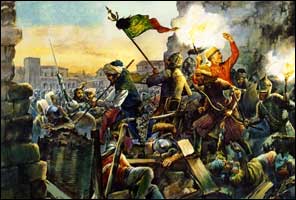
Terrible Turks
about to breach the walls
of Constantinople on May 29, 1453.
|
| |
The siege
of Constantinople was the Alamo of the East.
The heroic
defenders held out for 2 months against overwhelming odds, (200,000 v. 10,000), choosing an honorable death rather than
surrender and live as slaves under Islam!!
|
|
|
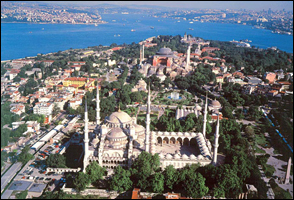
Constantinople
is now called Istanbul.
|
When Constantinople
fell to the Terrible Turks in 1453, the Greek Orthodox Church moved to Russia, and Moscow became known as the Third Roma.
That is the
reason why Napollyon Bonaparte and Adolf Hitler
invaded Russia.
Vital
links
References
Birley,
Anthony R. Septimius Severus: the African Emperor. Yale University
Press. New Haven, 1988.
Dio
Cassius. Roman History. Harvard University Press, Cambridge,
MASS, 1927.
Freisenbruch.
Annelise. Caesars' Wives: Sex, Power, and Politics in the Roman
Empire. Free Press, New York, 2010.
Levick,
Barbara. Julia Domna: Syrian Empress. Routledge, London &
New York, 2007.
Wright,
Dudley. Druidism: The Ancient Faith of Britain. E. P. Publishing
Limited, Yorkshire, England.
Copyright
© 2020 by Patrick Scrivener
Back
to Main Menu























